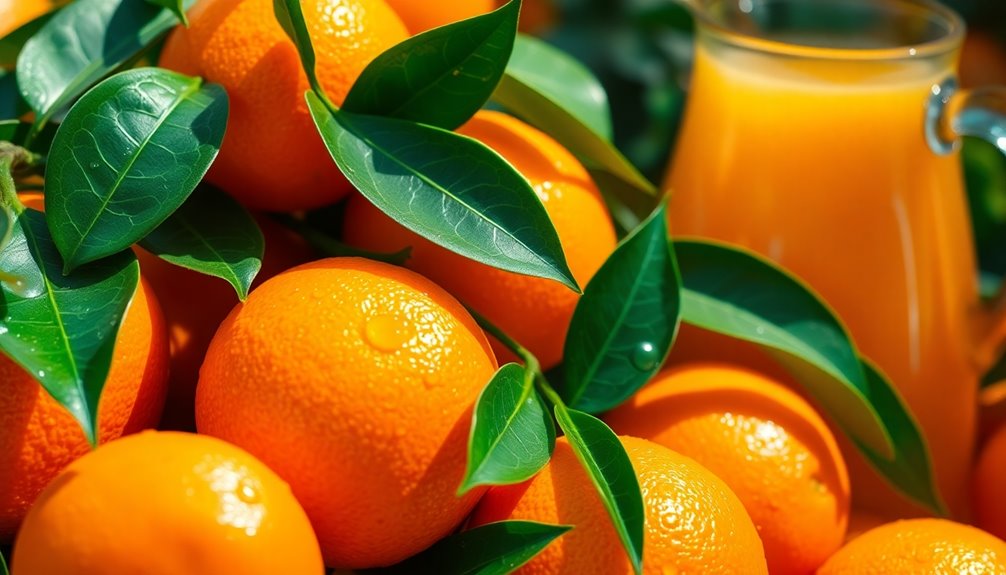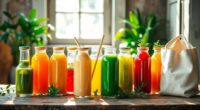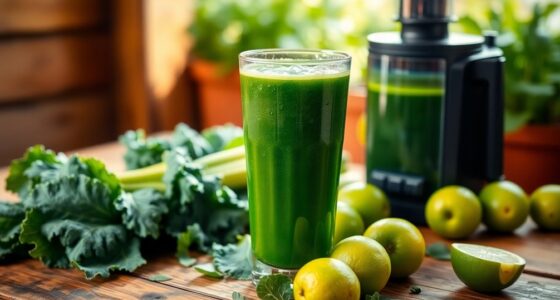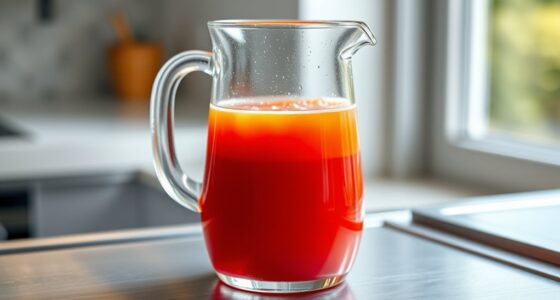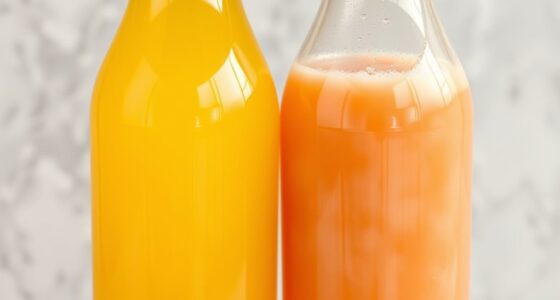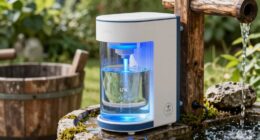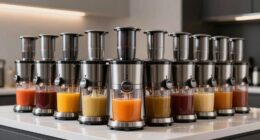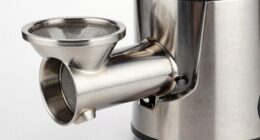To make that perfect cup of orange juice, you'll need about three to four medium-sized oranges. It really depends on the juiciness and variety of the fruit. Valencia and Hamlin oranges are great choices for high juice content. Remember to use fully ripe oranges for the best yield and flavor. Lastly, don't rush the juicing process—there are more tips and tricks to ensure you maximize your juice output.
Key Takeaways
- On average, a typical orange yields about 4 to 5 tablespoons of juice, translating to approximately 1/4 to 1/3 cup per orange.
- To make a standard 1 cup of orange juice, you'll need about 2 to 3 medium-sized oranges.
- Juice yield can vary depending on the orange variety; Valencia and Hamlin oranges are known for their high juice content.
- Fully ripe oranges provide better juice yields compared to unripe or overripe ones, impacting taste and volume.
- Using a juicer with adjustable speeds can optimize extraction, maximizing the amount of juice from each orange.
Understanding Orange Juice Yields
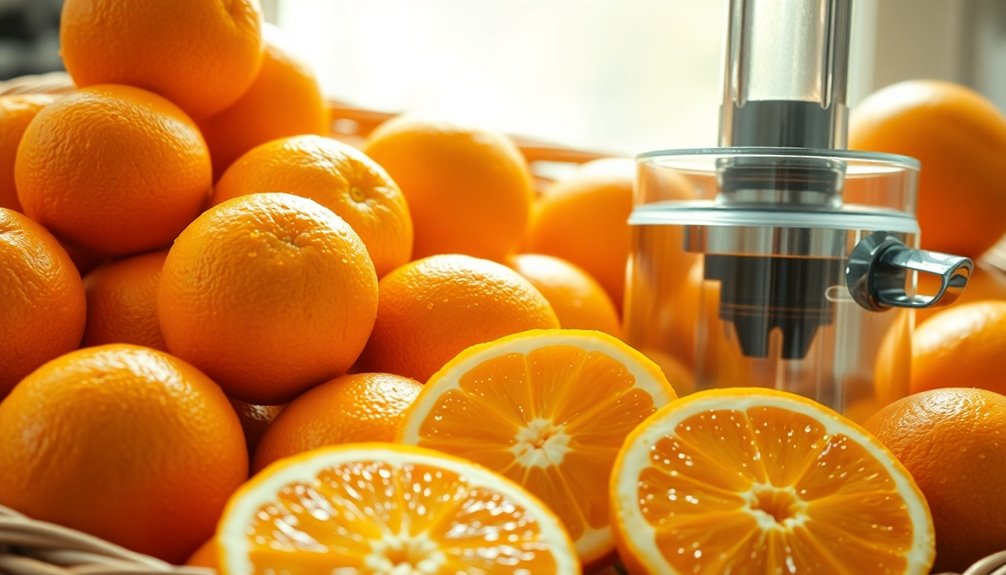
When it comes to making the perfect cup of orange juice, understanding juice yields is essential.
Juice yield can vary significantly based on factors like the type of oranges you use and the processing conditions involved. For frozen concentrated orange juice (FCOJ), you might expect around 1. 53 to 1. 66 gallons per box of oranges. Additionally, the frozen concentrated orange juice yield from the early-midseason crop is approximately 1. 14 gallons per box, which can impact your overall juice production. Moreover, weather conditions, such as temperature and rainfall during the growing season, can also influence juice yield. It’s important to note that not all oranges are created equal, as certain varieties may yield more juice than others. Ultimately, understanding these variables is crucial for maximizing the production of a gallon of juice from oranges, ensuring that both quality and quantity meet market demands.
Different regions, like Florida and Brazil, produce varying yields due to their unique climates and agricultural practices. Seasonal weather impacts both the quantity and quality of oranges, affecting your final juice yield.
Additionally, factors like fruit quality and harvesting challenges can influence how many oranges you need. Knowing these variables helps you gauge how many oranges to buy for that refreshing cup of juice.
The Science Behind Juice Extraction
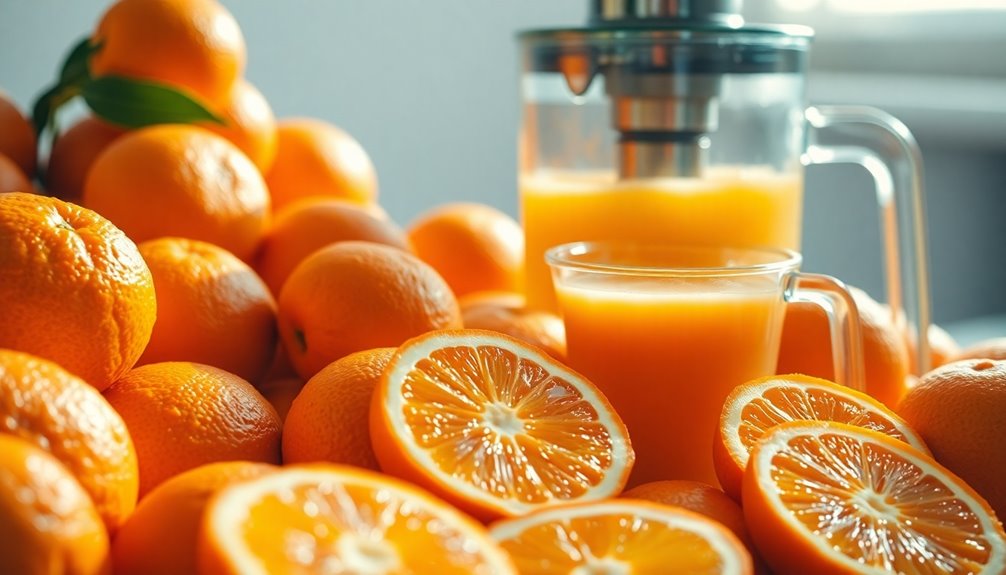
Understanding the science behind juice extraction can greatly enhance your orange juice experience. You can choose from various extraction methods, like mechanical extraction, where sharp tubes cut holes in the fruit, or the reaming process, which involves pressing halved oranges against serrated reamers. Tube extraction forces juice out through perforations, while peel oil recovery washes away oils for later use.
Once extracted, concentrated juice undergoes processes like vacuum evaporation to remove excess water, reaching 60-70 °Brix to achieve the desired sweetness and consistency. Pasteurization follows, heating the juice to 197 °F to eliminate enzymes, while deaeration removes air to extend shelf life. Finally, flavor packs and aroma restoration ensure your juice tastes just right, making each sip a delight.
Choosing the Right Orange Variety

Choosing the right orange variety can make a significant difference in the quality of your juice. If you're after high juice content and a balanced flavor, go for Valencia or Hamlin oranges. They're sweet-tart, juicy, and perfect for that refreshing glass. Hamlin oranges are excellent for juicing due to their high juice content and easy-to-peel skin. Blood oranges offer a unique taste and vibrant color, packed with antioxidants, while Cara Cara oranges bring a delightful berry-like flavor. Navel oranges, being sweet and seedless, can help balance any tartness in your juice blends.
The Role of Ripeness in Juice Quantity
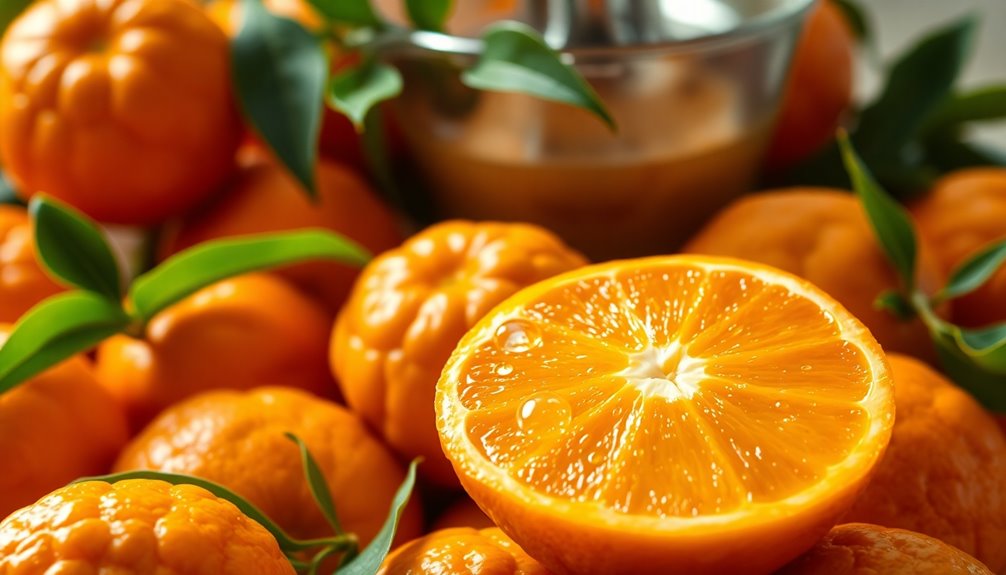
The right orange variety sets the stage, but ripeness plays a pivotal role in how much juice you'll get. Fully ripe oranges yield significantly more juice than unripe ones. Their higher sugar content and balanced Brix/acid ratio enhance both the volume and taste of your juice. In fact, the average yield is about 4 to 5 tablespoons of juice per orange.
Environmental factors like weather and soil quality influence ripening, so oranges grown in optimal conditions are juicier. When you juice ripe oranges, extraction is easier because they're softer.
However, overripe oranges may not juice well, leading to waste. For the best results, aim for peak ripeness, which maximizes not just the quantity but also the quality of your juice, delivering a refreshing, flavorful experience in every glass.
How Size Affects Juice Production
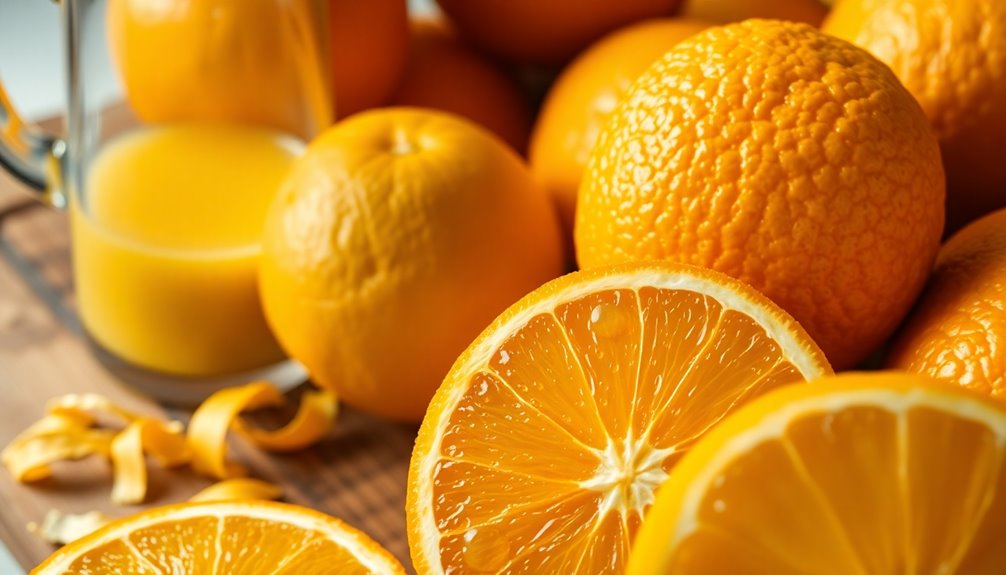
When it comes to juicing, the size of the oranges you select can significantly impact both the quantity and quality of the final product. Larger oranges typically yield more juice, but smaller ones often pack a punch with higher juice content relative to their size. This means you might get a more concentrated flavor from those petite oranges due to their increased soluble solids. Plus, smaller oranges have a higher specific gravity, which correlates with better juice yield. By sorting your oranges by size, you can ensure a consistent quality in your juice. Ultimately, balancing size and variety will help you achieve that perfect cup of juice every time. Additionally, it's worth noting that mobile traffic growth may influence the way juice recipes are shared and discovered online, which could affect your choices in juicing.
Comparing Oranges With Other Citrus Fruits
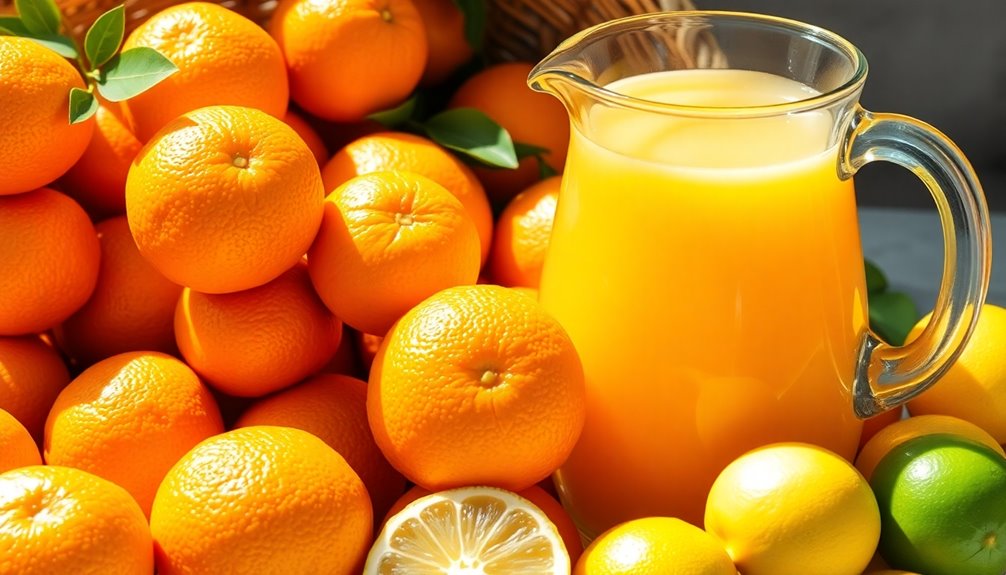
While oranges dominate the juice market, they're just one of many citrus fruits that offer unique flavors and uses.
Lemons and limes, for example, have a lower carbon footprint per kilogram and are often used in cooking and beverages rather than for juicing. You might notice that half of the lemons and limes consumed in the U.S. are imported, mainly from Mexico. Coffee consumption is also influenced by the availability of various fruits, impacting flavor preferences in beverages.
When it comes to tangerines and mandarins, about a quarter of these fruits also come from abroad. Recognizing the unique characteristics of each fruit can enhance your culinary experiences and allow you to appreciate the diversity of flavors available.
While oranges bring refreshing juice to your table, exploring other citrus options can enhance your culinary experiences.
Each fruit's market dynamics vary, influenced by consumer preferences and production costs, giving you plenty of choices beyond just oranges.
Tips for Maximizing Juice Yield
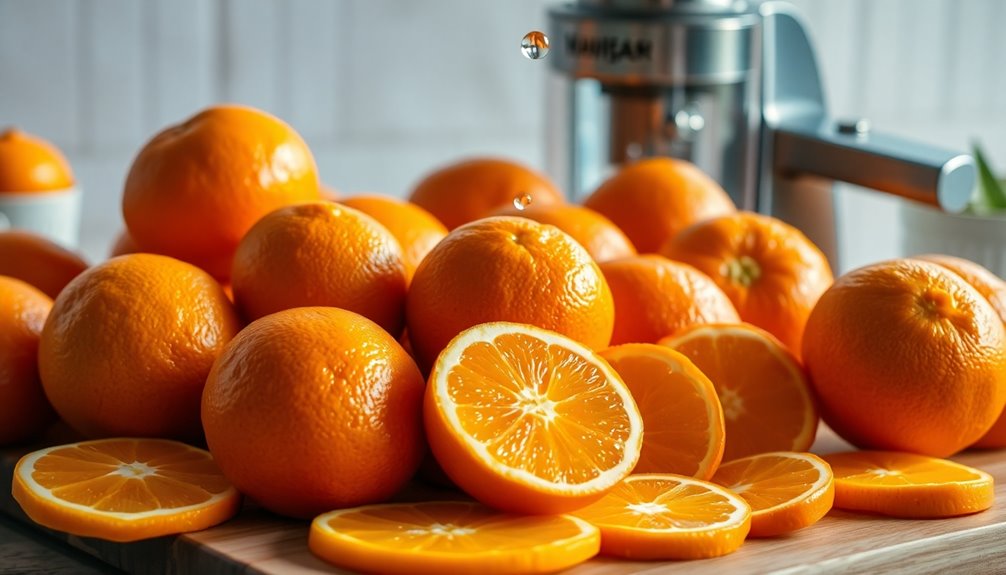
To maximize your juice yield, it's essential to choose the right produce and employ effective juicing techniques. Mixing different types of fruits can boost your yield by about 7%, so try combining softer and harder ingredients. Always remember that high-water content fruits yield more juice, while citrus fruits help break down fibers in others. Adjust your juicer's speed based on the firmness of the produce for optimal extraction. Additionally, testing different variables, such as shredder speed adjustments, can help optimize performance for various produce types. If you want to increase yield further, run the pulp through the juicer twice. For leafy greens, roll them tightly or sandwich them with harder ingredients. Lastly, keeping your juicer clean and well-maintained ensures it's always ready to perform at its best.
The Importance of Freshness in Juice Quality
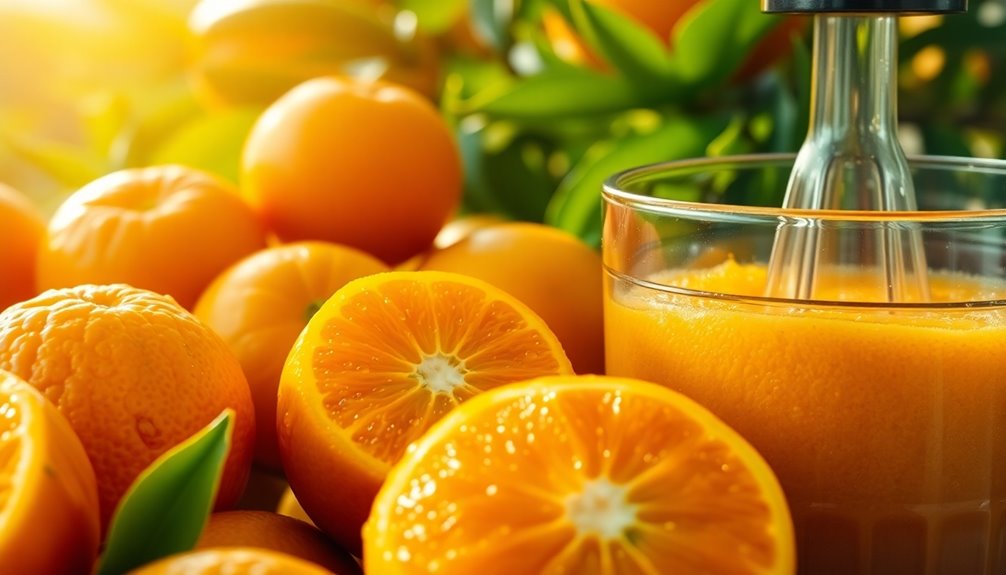
Fresh juice is crucial for both flavor and nutrition, as its quality directly impacts your overall experience. When you choose freshly squeezed juice, you get a vibrant taste that processed alternatives can't match. Fresh juice retains more vitamins and minerals, ensuring you're fueling your body right. However, keep in mind that fresh juice has a limited shelf life—typically just hours or days. To maintain that freshness, consider using a cold-press juicer, which minimizes heat and oxidation. Additionally, the cold-pressed method maximizes the extraction of nutrients, further enhancing the health benefits of your juice. To kickstart your day, pair your fresh juice with a protein-rich breakfast option like an egg rollup to keep your energy levels sustained. Proper storage is key; airtight containers at low temperatures work best.
Common Mistakes When Juicing Oranges
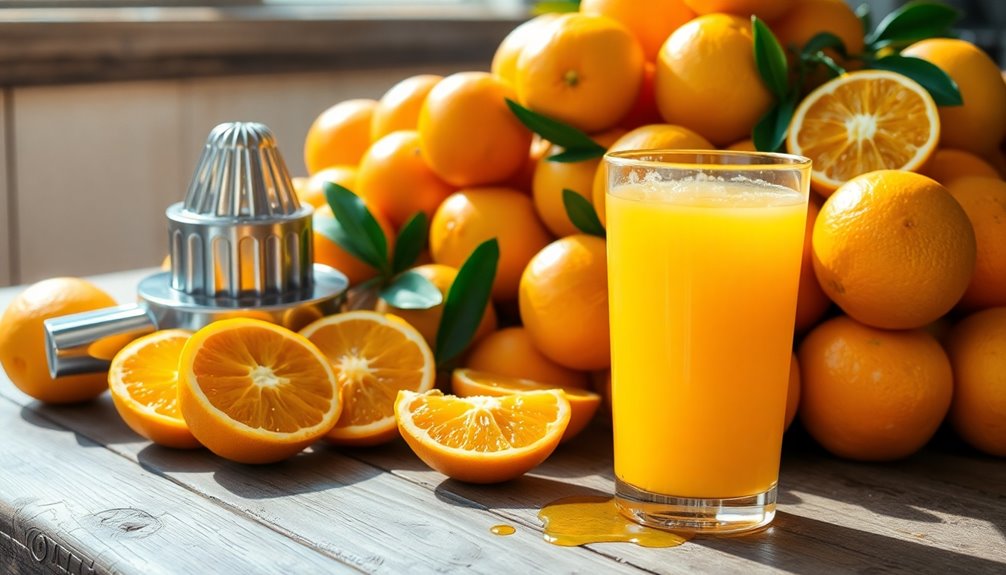
When you focus on freshness in your juice, it's just as important to avoid common mistakes that can ruin your orange juicing experience.
First, choose the right type of orange; Valencia oranges are sweet and flavorful, while Navel oranges can lead to bitterness if left too long. Additionally, harvesting at the correct time is crucial for optimal flavor. Picking oranges that are ripe papayas ensures you get the best taste and sweetness in your juice.
Don't ignore the quality of your produce—pesticide-laden oranges can introduce unwanted toxins.
Remember to consume your juice soon after preparation to maintain nutrients.
If you're storing juice, avoid plastic containers that can degrade its quality.
Lastly, take your time drinking the juice; rushing can hinder nutrient absorption.
Delicious Recipes Using Fresh Orange Juice
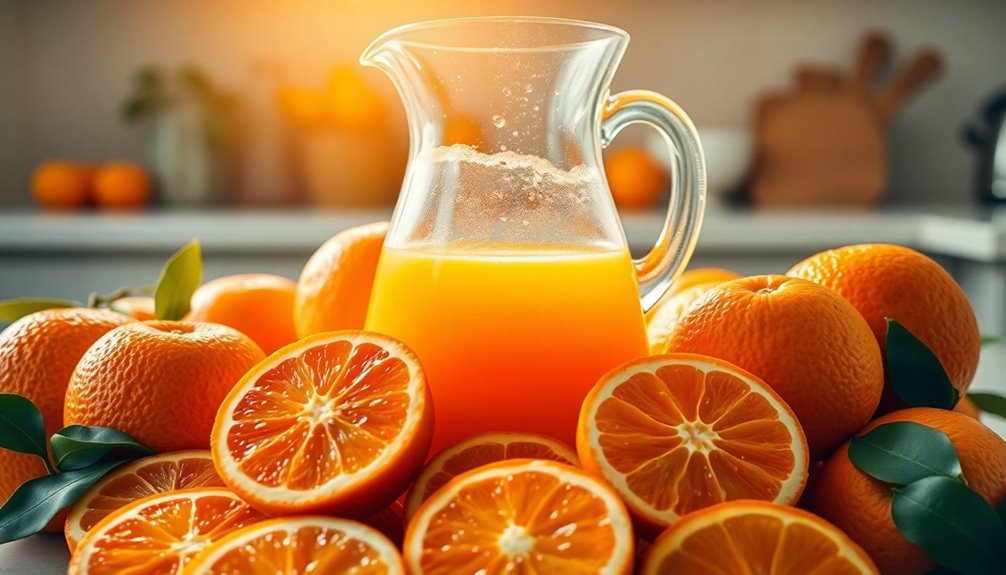
Orange juice is more than just a refreshing drink; it can elevate a variety of dishes with its vibrant flavor.
Use freshly squeezed orange juice as a versatile base for marinades, sauces, or desserts. You can enhance its taste with a pinch of salt or honey, or mix it with fruits like carrots and nectarines for unique juices. Freshly squeezed orange juice is also high in vitamin C, making it a nutritious addition to your dishes. Additionally, tropical fruits like mango or pineapple can complement orange juice beautifully, creating exotic flavor profiles.
Try adding ginger, mint, or basil for extra depth and nutrition. If you're looking for a creative twist, blend orange juice with yogurt for a refreshing smoothie.
It's packed with vitamin C, antioxidants, and hydration benefits, making it perfect for your health-conscious recipes.
Frequently Asked Questions
How Do I Store Oranges for Maximum Freshness?
To store oranges for maximum freshness, keep them in a cool, dry place away from direct sunlight for 1-2 weeks.
If you want them to last longer, refrigerate them in the crisper drawer at about 41°F (5°C).
Use mesh bags to allow airflow, and avoid washing them before storage to prevent moisture buildup.
Always keep oranges separate from ethylene-producing fruits to maintain their freshness and inspect them regularly for spoilage.
Can I Freeze Orange Juice for Later Use?
Yes, you can freeze orange juice for later use! Just pour it into well-sealed containers or freezer bags, leaving some space for expansion.
Freshly squeezed juice with pulp freezes well, preserving its flavor and nutrients. It can last up to 10 months in the freezer.
For added convenience, you might want to freeze it in ice cube trays for easy use in cocktails or refreshing drinks throughout the year. Enjoy your juice anytime!
What Equipment Is Best for Juicing Oranges?
When you're choosing equipment for juicing oranges, consider your needs.
For home use, the Breville Citrus Press Pro is a top choice due to its high juice yield and ease of use. If you're on a budget, the Black+Decker 32oz Citrus Juicer offers great value.
For commercial purposes, the Sunkist Juicer J-1 excels with its high capacity.
Look for models with dishwasher-safe parts to make cleaning a breeze!
Is Organic Orange Juice Better Than Non-Organic?
You might think organic orange juice is always better than non-organic, but it depends on what you value.
Organic juice reduces pesticide exposure and often has more nutrients, thanks to healthier soils. However, both types usually contain similar sugar levels and lack fiber.
Taste can vary, so it's worth trying both to see what you prefer. Ultimately, your choice should reflect your health concerns and personal taste preferences.
How Long Does Fresh Orange Juice Last in the Fridge?
Fresh orange juice lasts about 2-3 days in the fridge if you store it properly.
Keep it at or below 40°F (4°C) in an airtight container to slow spoilage. Make sure to avoid direct sunlight, which can degrade its quality.
If you're looking to extend its shelf life, consider vacuum sealing it, which can keep it fresh for about a week.
Always check for any signs of spoilage before consuming.
Conclusion
Now that you know how to get the most out of your oranges, you're ready to create juice that'll make even the sun jealous! Remember to choose the right variety, ensure they're ripe, and use the right techniques to maximize your yield. Avoid common pitfalls, and your fresh orange juice will be nothing short of liquid sunshine. So grab those oranges and start juicing—your taste buds will thank you for this citrusy adventure!
Susannah expertise lies in researching and compiling evidence-based content on juicing, nutrition, and overall health. She is committed to ensuring that The Juicery World offers accurate, up-to-date, and trustworthy information to empower readers to take control of their health. Susannah’s goal is to inspire individuals to embrace juicing as a way to nourish their bodies and live their best lives.

